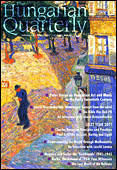The current editor of the Hungarian Quarterly tried, and for some reason failed, to post this as a comment on my own postings on the subject. I give his reply more prominence because I want to address his points in this slightly more visible space of a private blog. His comment:
As the person you are badmouthing I would like to post a comment. You write: "The latest editor ... had begun his defence of the new regime at the HQ by bad-mouthing some of my translations in order to demonstrate that the old editorship was far from perfect." I do not want the non-Hungarian speaking world to have to trust this ridiculous distortion, so allow me to clarify. I wrote in an article in Élet és Irodalom that I would not characterize one issue of the journal as bad just because I found a few translations in it less than perfect. The relevant passage is: "I found the translations of poems by Dezső Kosztolányi problematic in several places, though they were the work of internationally recognized poet and translator George Szirtes." I explicitly acknowledged your renown as a translator and the former editor in chief, Zsófia Zachár's excellence as an editor. My article had nothing whatsoever to do with the current regime, not a thing. The contention is utterly unfounded, as anyone who could read the original would know.
Regarding the website, which you note has vanished, the website was gone when I inherited the HQ, the company that had managed it was out of business, and all the material that had been uploaded was no longer available online anywhere. I have been working very hard to upload old issues to a new website currently under design. You write on another page: "It may be that the site is simply being revamped, but it wouldn't surprise me if it was taken off for much the same reasons that it was taken over." Since you and I have communicated by email, why not ask before posting a baseless conjecture?
In any event, as far as I can tell you are the person the most determined to kill the Quarterly. I simply don’t know why, except you don’t seem to be able to let go of the idea that I am somehow a stooge of the government. You say you know nothing of my politics, which is true, yet you argue I defend the present regime. Please, be so kind as to substantiate that. Find one citation in my article in Élet és Irodalom that makes any reference whatsoever to the present government. You published in a journal that included writings by György Aczél. I would not have characterized you as a stooge of the Kádár regime, and of course I would do anyone the professional courtesy of letting them know if I am accusing them in a public forum.
I will be curious to see if you publish this post. Perhaps you will censor it. At least I will see if you are actually supportive of open discussions.
A reply
I have italicised and emphasised in bold the substantive points the writer makes. I reply to them, not in the order they appear, but in order of what seems to me their importance.
First of all - here is your post, uncensored. All I have taken off is your name since I did not mention you by name in my original postings.
Secondly, this is not a public forum but a private blog with a very restricted readership. Having said that, I would in fact be happy to say the same things on a public forum if I thought anyone would consider it worthwhile publishing. At this level, I doubt it. For most of my anglophone readers - and I am first and foremost a poet in English - this is a skirmish about an obscure if honourable magazine in a far away country of which most know little. In any case, I stress, it is a private blog. Not like Élet és Irodalom, Hungary's equivalent of the TLS.
Thirdly, I certainly published in both the NHQ and the HQ in the past because I knew and grew to love the literary editor, who later became the editor. I was fully aware of the history of the periodical and understood the magazine, specifically the literary and cultural wing of it, as doing its independent best in the circumstances. The current editor - I mean you - has been in Hungary a while but has never made the least effort to contact me before.
Fourthly, the disappearance of the archive was brought to my attention by those who worked at the HQ. They didn't seem to know of any problem with the website, and what I say above - and what you quote me saying - is that I allow it may be being revamped, but that I have some doubts that is the full reason. Those doubts remain.
Fifthly, and least importantly, there are two aspects of your remarks on my work that strike me. The remark appears in the context of a counter-charge against the Hungarian Quarterly (as to say: look, they let this happen, which reflects badly on their judgment), in other words I am a means of criticising the previous editors. I don't like being a means. That is what I mean by bad mouthing. As for what you actually say, it is you, personally, who criticise a specific work, and, as your quotation shows, it is others - not you - who you admit have spoken well of my work generally. I am not stupid or vain enough to fret about your views of this or that particular work of mine, and if you were to point out what were the problems with the work I would consider them, as I consider any rational view. I am as capable of making mistakes as anyone and have never replied to a review, good or bad. It is simply poor policy to do so. Nor did I or will I reply to yours. I suspect this may be difficult to understand but it is not your views of my work that rankle, it is the context of those views.
The fact is I respond the way I do on the blog - really the only reason - because you then go and ask me for work. Since you do not give your own view of my work at any time, only that of others, and since, in our correspondence, you have actually worried that not having me in the magazine will make it look as though you had shut me out for political or other reasons, I think it reasonable to assume that it is the look of the thing that matters to you.
I am not prepared to be part of 'the look' of things, because the look of things is how I have perceived the current government - which is financing this magazine, as previous governments have done, for purposes of their own - to be proceeding in its appropriation of as many channels of cultural communication as it can.
I am perfectly prepared to believe that you have no political affiliation (I have said so on the blog), and that as an individual you may hold any views you like and want the best for the magazine. The fact is there was a Hungarian Quarterly with people I actually loved. Those people are gone. There was a hiatus in the publishing of the magazine, and here it is now, with new people. This happens in a political climate of which I am not ignorant and I doubt you are either. So, lastly,
My article had nothing whatsoever to do with the current regime, not a thing.
I am sure no-one was dictating your article to you. I believe you have not consciously considered the views of the government in writing it. But you know the context as well as I do. The Hungarian Quarterly is an English-speaking face of Hungary. The magazine was founded for political reasons and it is pointless telling people it is without political significance. The context matters.









